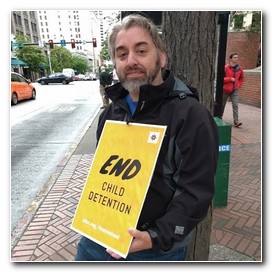It came about the next day that Moses sat to judge the people, and the people stood about Moses from the morning until the evening. Now when Moses’ father-in-law saw all that he was doing for the people, he said, “What is this thing that you are doing for the people? Why do you alone sit as judge and all the people stand about you from morning until evening?”
Moses said to his father-in-law, “Because the people come to me to inquire of God. When they have a dispute, it comes to me, and I judge between a man and his neighbor and make known the statutes of God and His laws.”
Moses’ father-in-law said to him, “The thing that you are doing is not good. You will surely wear out, both yourself and these people who are with you, for the task is too heavy for you; you cannot do it alone. Now listen to me: I will give you counsel, and God be with you. You be the people’s representative before God, and you bring the disputes to God, then teach them the statutes and the laws, and make known to them the way in which they are to walk and the work they are to do. Furthermore, you shall select out of all the people able men who fear God, men of truth, those who hate dishonest gain; and you shall place these over them as leaders of thousands, of hundreds, of fifties and of tens.
Let them judge the people at all times; and let it be that every major dispute they will bring to you, but every minor dispute they themselves will judge so it will be easier for you, and they will bear the burden with you. If you do this thing and God so commands you, then you will be able to endure, and all these people also will go to their place in peace.”
So Moses listened to his father-in-law and did all that he had said. (Exodus 18:13-24)
My ex explained to me one day that this is how the concept of the “minyan” came about in Judaism. This story shows that a group of ten is the smallest number of people that are under leadership, so a group of ten can perform any official Jewish function. This story is also where the basic layout of the Jewish justice system came from. I smiled and went about my day for about ten minutes before the realization hit me.
That means that a non-Jew helped set up some of the most central community practices in the Jewish tradition. A priest from another culture made sure that Moses avoided burnout, and that smaller communities were put together so that people could resolve differences on the scale they deserved.
This is interesting to me, especially since so many religious people these days act like no one who is not the exact same kind of religious person they are has anything of value to say about faith and its practice. We see this a lot in debates around scholarly work that lesbian, gay, bi and trans religious people have done. It is often disregarded out of hand by non-SGL/LGBT people because we are looked at as “having an agenda” and trying to “force our views” on all these nice people of faith.
But we do have important things to say about faith and the practice of it. Much like Moses’ father-in-law Jethro, our lives have taught us a lot about things that the church is uncertain about or would rather not touch. Instead of inviting us to the table, listening respectfully, and learning from our lives, the church does the same thing Moses does. They decide that since they are called by God, they need to sit in judgment on every detail of our lives, from the largest to the smallest. So the energy that should be directed at learning from God is misdirected into micromanaging the lives of the people around them as an expression of faith.
As Jethro said “This thing you do is not good.” We in the SGL/LGBT community must continue to call our places of worship out on the patterns of power abuse that plays out over and over again, but we cannot do it alone. Instead, I would encourage us to continue to build coalitions with other groups who are affected by the micromanaging attitudes of some religious folks, and work honestly to continue to speak the truth of our lives to the people in power who would rather ignore us.

Michigan native Lincoln Rose relocated to Seattle in the mid-2000’s, where he pursued religious studies and became active in the local community as a member of Trans Lives Matter, the Trans Jail Policy Group and Emerald City MCC Seattle.
